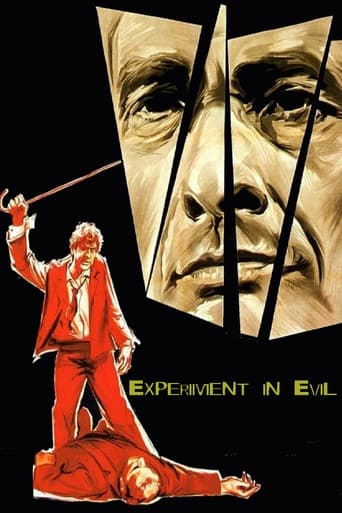kosmasp
I can see what everyone who enjoyed the movie sees in the film. There are quite a lot of good intentions in this one. Still the execution (I guess because it was made for TV) is not up to other Renoir movies. It also has dated quite badly. On the other hand, I watched the dubbed version, so I can only criticize the voices that were used, but I can also say that the body acting wasn't up to any good.It's a shame that this didn't work for me, as it did for some people here, because I love quite a few Renoir movies and I was looking forward to this one. Yes there is a twist to the story, but I actually don't think it is that big a deal. Just because other movies who have adapted this, haven't gone that route (if you wanna know what this is based on, read the other reviews, many do write about it, I don't want to spoil it, in case you wanna watch the movie).
Boba_Fett1138
This is a rather unusual but successful take on the famous Dr. Jekyll and Mr. Hyde story, written by Robert Louis Stevenson, that was first published in 1886.In this French take on the story the story and settings are changed to the more 'modern' France of the '50's. But don't worry, they didn't changed the main character much, only his name. As a matter of fact Opal is perhaps far more brutal and a bad guy than his predecessors from earlier Dr. Jekyll and Mr. Hyde movies.The movie is more of a thriller and mystery movie than an horror. In that regard "Le Testament du Docteur Cordelier" already works as a surprising and effective movie. It provides the movie with some nice twists (especially obviously when you aren't yet familiar with the story of Jekyll & Hyde) and original moments. Yet the movie never truly manges to captivate the viewer with its story. It's too lacking in suspense for that.Still "Le Testament du Docteur Cordelier" remains a far better than average movie. This is mainly due to its fine visual style which suits the movie well and the professional directing from acclaimed French movie-maker Jean Renoir.Jean-Louis Barrault gives a fine performance as Dr. Cordelier/Opale, although he plays Opale a bit too much like a drunk. It doesn't however makes his performance any less powerful- or believable. Most of the other actors also give a fine performance, although however some of them are really below par.Still all in all "Le Testament du Docteur Cordelier" remains a good and surprising enough movie to satisfy its viewers. Far from the best Dr. Jekyll and Mr. Hyde movie but a more than good and above all, original attempt, from Jean Renoir, nevertheless.7/10http://bobafett1138.blogspot.com/
Cineanalyst
This is an interesting adaptation of Robert Louis Stevenson's "The Strange Case of Dr. Jekyll and Mr. Hyde", made for television by Jean Renoir, although late in his career--after his most acclaimed masterpieces. For this adaptation, the names are changed (from Jekyll and Hyde to Cordelier and Opale, most importantly), and it takes place in a modern Parisian setting, but compared to other adaptations, especially the three Hollywood movies, it's more faithful to the original novella. The original mystery is retained. If one weren't familiar with the Jekyll and Hyde story, this version would actually be surprising, especially with the name changes and new setting. Furthermore, Mr. Utterson (here as Mr. Joly), the protagonist of the novella, is reassigned his original purpose here, after being ignored in most adaptations.There are alterations, though. The narrative is made linear, as in most adaptations. And, director Jean Renoir makes his own alterations, occasionally suggesting the alterations made for plays, which were sustained in the 1920, 1931 and 1941 films, such as one scene that gives Hyde an apartment and the female victim for his animalistic sadism. That wasn't in the book, occupies only one scene in this film, but was the focus of the 1941 Spencer Tracy and Ingrid Bergman version. As well, I especially like Renoir's addition of an audio testament.The absence of special effects for the metamorphoses (here, really only one) is simple and refreshingly inconspicuous, with Jean-Louis Barrault assuming the fetal position while camera positions are changed, instead. Additionally, Joseph Kosma's light music during Opale's scenes is a nice touch. And, Barrault gives an interesting interpretation of Hyde, moving limply and dance-like. The over-sized clothes are a nice remnant from the novella, too. Overall, it's an interesting adaptation. My favorite Jekyll and Hyde version is the 1931 film, but because of its use of the camera; as far as narrative adaptations, this is the best that I've seen.(Note: White subtitling was a poor choice for the print I saw; they were sometimes illegible.)
OldTree
This is a French TV film with the quality of a major cinema production. The opening is pretty unusual - director Jean Renoir plays himself as he arrives at the studio and then makes the concluding audio recordings as the narrator of his film.It's a fascinating variation of the Dr. Jekyll & Mr. Hyde theme, this time they are called Dr. Cordelier and Monsieur Opale. It's nearly unbelievable that both are played by one actor: Jean-Louis Barrault. How he uses his pantomimic and dancing abilities to portray Opale, the dark incarnation of Cordelier freed from all moral restraints, is phenomenal. His body movements and facial expressions are so weird ... and the walking-stick in his hand almost seems to lead an own life. What an outstanding performance!



